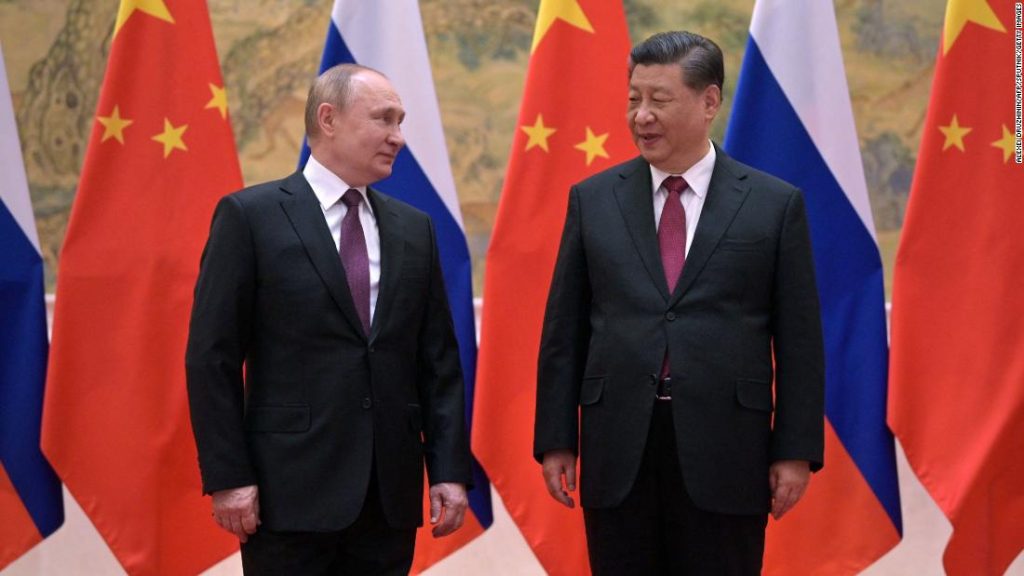
Beijing also expressed its full support on Wednesday for comments made earlier this week by China’s ambassador to Ukraine. “China will never attack Ukraine. We will help, especially economically,” Fan Xianrong was quoted as saying in a press release from the Lviv regional government.
Concerns that Chinese companies could face US sanctions over ties with Russia have contributed to an epic sell-off in Chinese stocks the last days. That decline was reversed on Wednesday when Beijing promised that it would pursue policies to boost its faltering economy and keep financial markets stable.
Beijing and Moscow share a strategic interest in defying the West. However, Chinese banks cannot afford to lose access to the US dollar, and many Chinese industries cannot afford it To be deprived of American technology.
While China is Russia’s number one trading partner, Beijing has other priorities. Trade between the two countries accounted for only 2% of the total volume of Chinese trade. The European Union and the United States have much larger shares, according to Chinese customs statistics for the past year.
Here are some of the measures Beijing has taken in the past few weeks to distance itself From isolated and falls apart Russian economy.
Let the ruble drop
China’s currency, the yuan, does not trade completely freely, and instead moves within ranges set by officials at the People’s Bank of China (PBOC). Last week, they doubled the size of the ruble’s trading band, which allowed the Russian currency to depreciate even faster.
The ruble has already lost more than 20%. of its value against both the dollar and the euro since the beginning of the war in Ukraine. By allowing the Russian currency to depreciate against the yuan, Beijing is doing Moscow no favors.
Sit on reserves
The most significant help China can provide to Russia is through the $90 billion reserves Moscow holds in yuan, Alicia Garcia-Herrero, chief Asia-Pacific economist at Natixis, wrote in a research report Tuesday.
The sanctions have frozen $315 billion in Russia’s reserves – or nearly half of the total – as Western countries have banned the Russian Central Bank.
The People’s Bank of China (PBOC) has not yet commented on its position on these reserves.
Garcia Herrero noted that if China allowed Moscow to convert its yuan reserves into US dollars or euros, “it would obviously help Russia in the current impasse.” However, she said, “the discrediting risk of a potential breach of Western sanctions would be a huge step for the People’s Bank of China (PBOC) to take, and thus make it highly unlikely.”
“The long-term gains of getting closer to Russia may not be commensurate with the effect of Western investors suddenly losing interest in China,” she added.
Withholding aircraft spare parts
This means Russian airlines could run out of spare parts in a matter of weeks, or fly planes without replacing equipment as frequently as recommended to operate safely.
Earlier this month, a senior Russian official said China refused to send aircraft parts to Russia while Moscow searches for alternative supplies.
Russia’s state news agency TASS quoted Valery Kudinov, head of airworthiness at the Russian Air Transport Agency, as saying that Russia will look for opportunities to acquire parts from countries including Turkey and India after a failed attempt to obtain them from China.
“As far as I know, China refused,” Kudinov was quoted as saying.
In response to CNN’s request for comment, the Chinese Foreign Ministry reiterated Beijing’s comments The sanctions opposition added that China and Russia would maintain “normal economic and trade cooperation”.
Freezing investment in infrastructure
The World Bank suspended all of its programs in Russia and Belarus after the invasion of Ukraine. It has not approved any new loans or investments to Russia since 2014, nor has it approved any new loans or investments to Belarus since 2020.
Most surprising, perhaps, is the decision of the Beijing-based Asian Infrastructure Investment Bank to do the same. In a statement issued earlier this month, it said it would suspend all of its activities related to Russia and Belarus “as war breaks out in Ukraine”. She added that the move was “in the interest” of the bank.
CNN’s Beijing bureau and Hannah Ritchie’s Sydney contributed to this article.





More Stories
Jasper Fire: Latest map after wildfires erupt in Jasper National Park, Alberta
SNCF: French high-speed trains disrupted by ‘coordinated sabotage’ ahead of Paris Olympics opening ceremony
Macron Responds to Left-Wing Efforts to Rule France – Politico